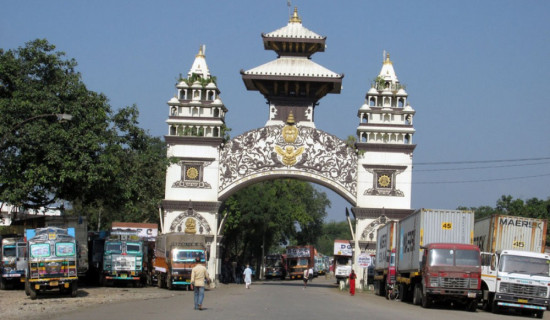- Tuesday, 3 March 2026
Ecological Ethics Vital For Peace
Ecological ethics is closely tied to respecting nature with its self-creative ecosystem of amazing complexity. The resilience of natural resources is vital to repair ecological units and ensure the survival of all living species. The faith in what Arne Naess calls “deep ecology” does not consider human beings above the ecosystem. Sustainable progress keeps them within nature's ecosystem along with plants, animals, water creatures and microorganisms. As conscious beings, humans have a moral duty to preserve the eco-balance and secure the future of unborn people.
This is the reason ecological ethics occupies the attention of social scientists, statespersons, environmentalists and the general public because they know the ethical effects of human action on ecology, biodiversity, sustainable use of resources for cohesive development and responsible leadership for the Earth's politics. Sustainable use of resources, equity and ownership of Nepalis in development are correlated. A virtual cycle among these values avoids the flaws of scarcity and feral struggle and contributes to social justice and sustainable peace.
Challenges
Nepal ranks 69th in the Climate Risk Index 2025. It spotlights Nepal’s vulnerability to climate-induced disasters like floods, avalanches and other epidemics. The rise of global temperature to 1.5 degrees Celsius has brought drought in many parts of the nation, melting of the Himalaya ice and lowering of the water table in Tarai on an average of 3 feet, affecting irrigation. The loss of forest cover is generating a struggle between humans and wild animals. The forage of wild animals in conservation areas in Chitwan, Parsa, Bardiya and Koshi demonstrates this.
Nepal has lost genetic diversity of rice, maize and herbs, while genetically modified wheat, maize and rice failed to yield in Mahottari, Sarlahi and Kailali districts not long ago. Sporadic heavy rainfall has washed the fertility of the soil, causing a decline in food production. These factors stoke challenges to social peace. Scarcity breeds poverty, forced migration, joblessness and conflict. Environmental sustainability is imperative for food availability, agricultural and industrial development, cultural nourishment and positive peace. Every year, Nepal faces devastating floods, landslides, loss of property and life.
Just this year flood in the Lende River has damaged vital trade infrastructure at the Nepal-China border, a dry port under construction and crippled the Rasuwagadhi-Kerung trading route. Earlier, the Koshi flood wreaked havoc in the eastern part of Nepal and India. Heavy floods in Kagbeni, Mustang, swept away 30 houses while a torrent of recent monsoon rain claimed 49 lives and destroyed huge property. Nepal has faced a wide array of ecological issues, such as loss of Himalayan glaciers, danger of glacial lake burst of Chho Rolpa, urban pollution, digging of mountains and rivers for sand and stone, deforestation and land grab in the river banks.
Peace building through ecology means protection and apt utilisation of the environment for present and future generations of people without weakening its self-generated resilience and self-renewal. The social, cultural, and economic policies need to be compatible with ecological ethics. Nature is not the enemy of human beings, but its excessive exploitation beyond limits bears negative fallouts, such as soil degradation, industrial and nuclear contamination of rivers and oceans, depletion of oxygen, and global warming. They are a looming problem in the future.
The use of chemical fertilisers, pesticides and insecticides deteriorates the fertility of soil and human health. The rhythms of natural life are important for the availability of water, land and other useful minerals vital for human survival and progress. Assimilation of overpopulation leads to the dearth of natural resources. This chaotic situation puts pressure on the government to manage the conflict peacefully.
Nepal has formulated a climate adaptation plan 2021-2050, aiming to integrate climate change adaptation at all levels of planning and activities. It is aligned with the Nationally Determined Contribution as per the demand of the Paris Agreement. It is increasingly using ecological ethics in the forms of alternative sources of energy such as biogas, hydropower and solar panels, undertaking reforestation and green economy and sustainable agricultural practices. The nation aims to improve its forest cover to 45 percent by 2030. Periodic plan and endorsement to SDGs require climate adaptation and climate action. The growth of community forestry bears a positive effect.
The nation aims for the target of zero emissions. The government has formulated a scheme for Chure protection through reforestation. Planning for water resources management is afoot. Similarly, disaster-ready policies and strategies are underway. Ecological awareness and movement and Nepal’s constitutional promise of people’s right to a clean, green and healthy environment, are mobilising a moral voice for collective action. Ecological ethics cannot flourish if Nepal’s poverty, inequality, overpopulation and declining job opportunities in the nation create a vicious nexus between structural injustice, ecological stress and a situation of livelihood concern.
Daily survival
Bulks of poor people depend on natural resources for their daily survival, while the commercial classes, contractors and special interest groups recklessly exploit natural resources for wealth accumulation. It has become a tough task due to the complex topography and climate variation. Territorial disputes have added another layer of eco conflicts. However, these conflicts can be mitigated by adopting different mechanisms, like applying conflict-sensitive and decentralised resource management at the community level for long-term goals.
Ecological ethics leads to the alleviation of scarcity, reduction of violence entrenched in economic and political policies and attainment of sustainable peace. Conflict occurs when policies and practices of development are less rooted in ecological ethics. This transnational problem needs cross-national cooperation, as climate change does not respect political boundaries. A coordinated solution of national, regional and international efforts are imperative for development and peace. This means ecological preservation requires institutional capacity and intergenerational cooperation to reconcile ecological needs, justice and peace.
(Tara Dahal holds an MA in Peace and Conflict from Otto-Von Guericke University, Germany)






-original-thumb.jpg)









